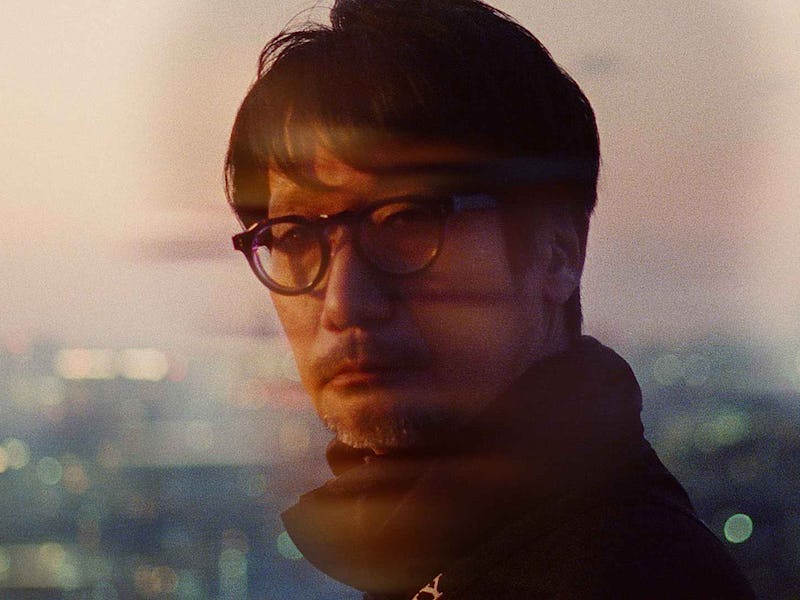Hideo Kojima: Connecting Worlds Focuses on the Myth Rather Than the Man
Let’s go deeper.

The dichotomy of the world’s most well-known artists is that everybody knows who they are but nobody really knows anything beyond what they put into their art. This is true of Hideo Kojima, the famed creator of Metal Gear Solid and Death Stranding.
Hideo Kojima: Connecting Worlds, a new documentary from Glen Milner, seeks to solve that problem for the game developer. Premiering at the 2023 Tribeca Festival, Connecting Worlds attempts to tell a story of the man and the process behind the art, but fails to draw any meaningful connections between either.
In the opening minutes of Connecting Worlds, Kojima’s erstwhile BFF Geoff Keighley describes Kojima as “probably the most well-known game creator in the world.” While the stated purpose of the documentary is to peel back the layers of this behemoth, Keighley's is a more accurate thesis. The hour-long documentary from PlayStation Studios, in partnership with Kojima Productions, is predominantly concerned with building the myth that is Kojima — without adding any new information.
While the development of Kojima’s independently developed Death Stranding is used as the anchor of the documentary — most footage occurs through interviews and behind-the-scenes footage during development — this is not a documentary interested in the day-to-day of developing a Kojima game. The cursory shots we do get of a period of development in 2018 are used to focus on how Kojima involves himself in every level of development. The film positions him as an auteur — but in a completely uncritical manner. This is not the unflinching portrayal of the development scene in Double Fine’s PsychOdyssey.
Auteur theory holds that the director of a film is responsible for the entire vision of their art in such a way that they are akin to an author of a book. Auteur theory has been widely criticized for mythologizing individual creators in a medium that relies on countless other people in front of and behind the camera. Video games, in their constant attempt to earn prestige by adhering to the language of cinema, have also taken an interest in auteur theory.
Yet for Connecting Worlds, Kojima’s status as an auteur is praise-worthy — despite video games being one of the most collaborative artistic mediums around. Connecting Worlds centers Kojima in his own words, with other members of Kojima Productions chiming to fortify the notion that a “Kojima game” is something entirely made from one man’s being. Connecting Worlds dives into Kojima’s well-documented love of cinema, and aspiring to be an auteur tracks with his artistic inspirations.
Connecting Worlds was filmed during the development of Death Stranding, but offers little insight into the actual development process.
From the first trailer for Connecting Worlds, I could have told you this would be a pretentious documentary that lifts up the ego of an already widely beloved and mysterious creator. That wasn’t surprising. Where Connecting Worlds does surprise is in how shallow it stays throughout its short runtime.
As a portrait of Kojima, Connecting Worlds shares little new information. The most revelatory moments come in Kojima’s recollection of growing up in Osaka. Key moments include his rough relationship with his father, whose death freed Kojima to do what he wanted — work on video games. Kojima also digs into his obsession with the 1970 World Expo, whose slogan “Progress and Harmony for Mankind” became a driving theme for his work. These moments are beautifully animated in a charming retro anime style, but are few and far between.
Bizarrely, none of Kojima’s work at Konami is discussed. If Connecting Worlds aims to be the Rosetta Stone of Kojima as an artist, then it omits the crucial middle section that lets us understand how he grew from that kid in Osaka to the renowned video game auteur he is today.
Coming out of Hideo Kojima: Connecting Worlds, the biggest question on my mind is “Who is this for?” Hardcore fans already know more than the documentary reveals, and it’s just too steeped in the gaming world to be welcoming to those who don’t already know Kojima. All it accomplishes is an empty echo of something we already know — Hideo Kojima is probably the most well-known game creator in the world.